2024 Garlic Planting Season Is Here!
October is a great time to plant garlic; click here to learn more about our selection of garlic, planting information, and harvesting.
Read More
Helping Tri-City Gardeners Grow Since 1940!
Job's Nursery LLC is a family owned nursery and tree farm that offers a wide selection of outdoor plants that are hardy for our area. We are located just north of Pasco on Columbia River Road. It's a short trip to a beautiful location to escape the hustle and bustle of your everyday life.

October is a great time to plant garlic; click here to learn more about our selection of garlic, planting information, and harvesting.
Read More
October is the end of the year's irrigation season. Here are the shut off dates for many of the local irrigation districts. Also, how to prepare your yard for it.
Read More
Japanese beetles cause leaves to appear skeletonized. Photo Credit: Ohio State University.
Japanese Beetles have been found Pasco this year between the Columbia River and I-182. Japanese Beetle is highly destructive to gardens, landscapes, and, most importantly, local agriculture; that is why the Washington State Department of Agriculture (WSDA) is trying to control and eradicate it from Yakima, Benton, and Franklin counties. They provide treatments with consent in the spring for larvae and ask people to report sittings of Japanese Beetle, treat for the adults, and not take plants, yard debris, or soil out of the quarantine areas. For more information, here are many links to get you started. We carry many insecticides to treat the adults and help educate how to apply the sprays.
Read More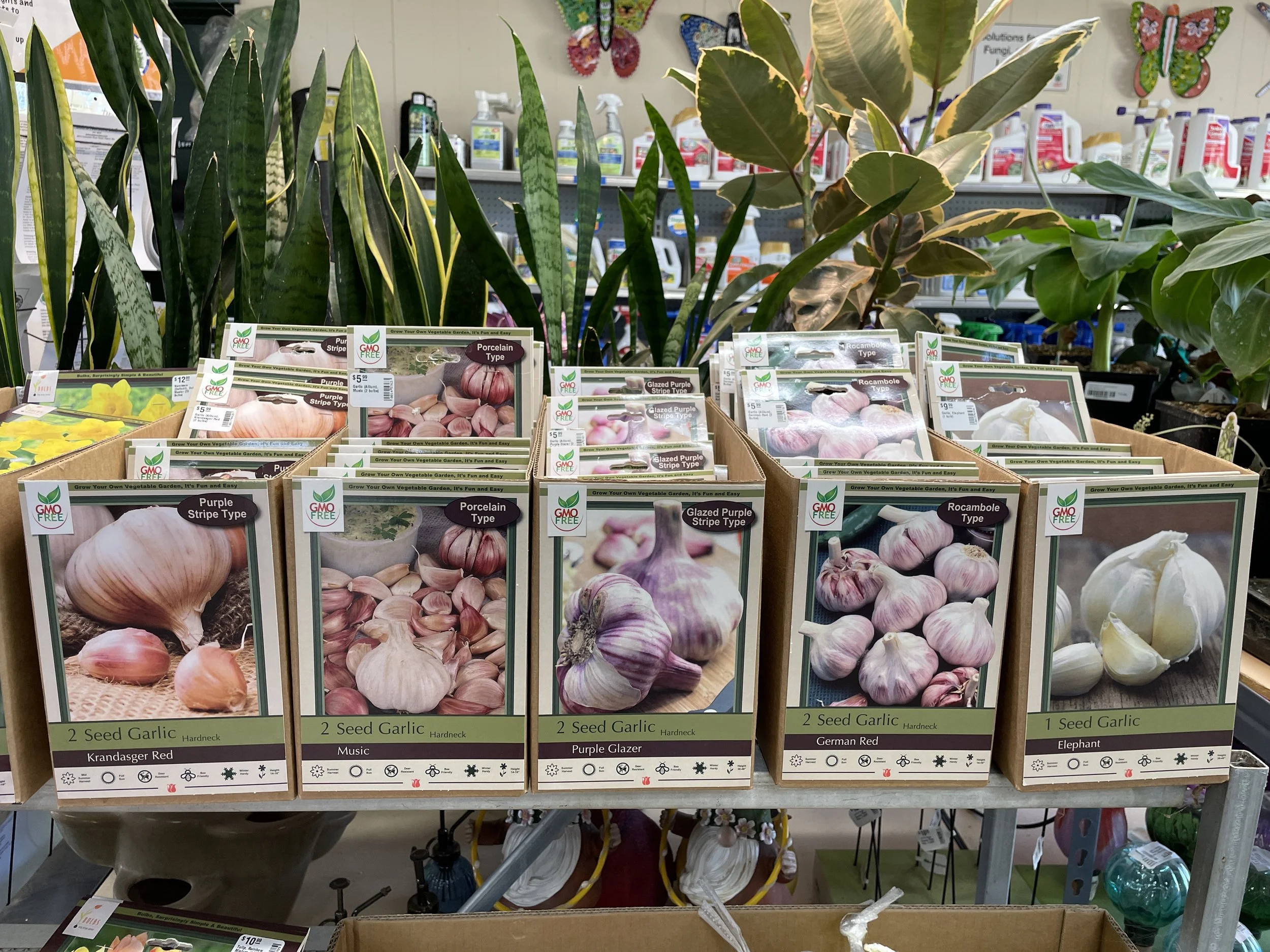
Fall is for planting garlic. We have several hard-neck garlic varieties to meet your culinary aromatic needs. Click to learn more about hardneck garlic, planting tips, and what we have for selection for the fall of 2023.
Read More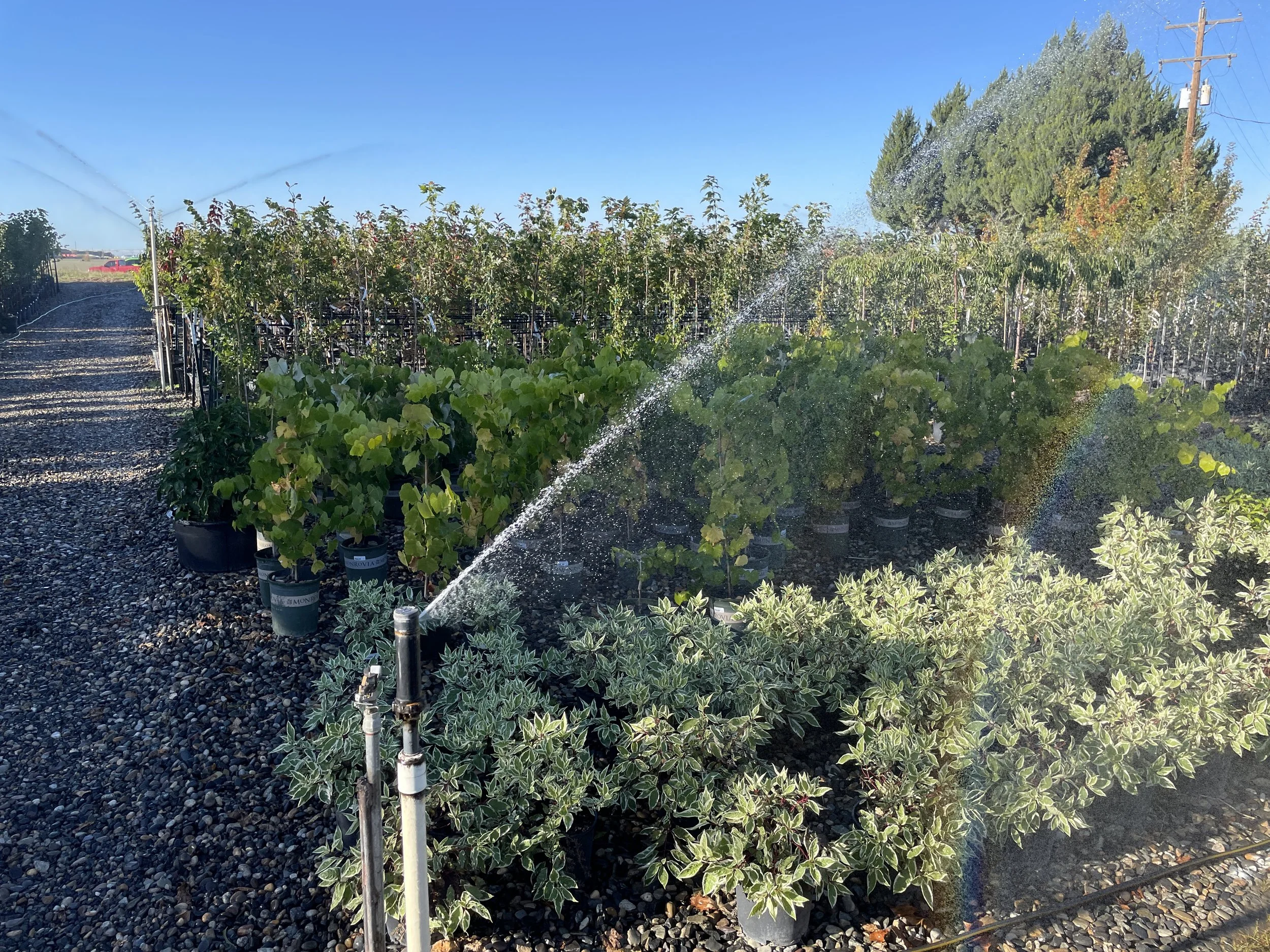
October brings the end to the irrigation water season, and we wanted to share when several of the local irrigation districts are ending the irrigation water season and some tips for your landscape to make it through winter better.
Irrigation Districts
Benton Irrigation District Oct 13th
Badger Mountain Irrigation District Oct 20th
Columbia Irrigation District Oct 13th
City of Pasco Irrigation Oct 16th
City of Richland Irrigation Oct 16th
East Columbia Irrigation District Oct 23rd
Franklin County Irrigation District Oct 23rd
Kennewick Irrigation District Oct 11th
South Columbia Irrigation District Oct 23rd
Before the water goes off
-Ensure everything in the yard gets a good drink; nothing is dry or wilting.
-Deep soak evergreens, and then make a recurring phone/calendar reminder to check the evergreens once a month through March.
-Make a fix list to repair before spring if sprinklers or valves are leaking, broken, or haven’t worked correctly.
-Review this list of plants that do well getting a drink in winter.
After the irrigation, the irrigation water is off.
-Clean your filters. That way, they are good to go in spring.
-Get your sprinkler lines blown out
-Disconnect your hoses from outdoor faucets
-Drain garden hoses when not in use
-Clean your sprinkler screens, inspect the sprinklers for wear and tear like springs, nozzles, or threads repair if needed
-Put your irrigation timer either in standby mode or off, depending on model or brand recommendations for winter storage. There is no need to have your valves turned on and off all winter.
-Consider upgrading your irrigation timer if it’s hard to program for modern smart controllers that use phone apps for programming vs the mystery dial.
A quick video on some tasks to get done before hot weather sets in.
Read More
Here is where to recycle your Christmas Tree in Pasco.
Read More
Here are a few tips we wanted to share when it comes to picking pumpkins
Wear gloves, long pants and closed toed shoes. Pumpkin vines can be prickly, so this helps it from being a scratchy experience.
Secure your keys in a deep pockets, purse or backpack. Keys have a habit of disappearing in patches, so make sure they are safe and secure.
Bring cameras with plenty of memory and battery charge. You never know when a moment with the family needs to be captured for posterity.
If carts and pruners are available, use them. Pumpkins can get heavy carrying from the patch to checkout and the parking lot.
Choose pumpkins with no soft spots or cracks and intact stems. This way they keep until Halloween. Scars, dents, or flat spots are good for carving character.
Have fun and let your creative juices loose! Pumpkins are a great canvas of creativity for carving, painting and culinary pursuits.

October 2018 is here and for irrigation water, it’s the end of the season. Here are the end dates for the different irrigation districts.
Badger Mountain Irrigation District Oct 19th
Benton Irrigation District Oct 12th
City of Pasco Irrigation Water Oct 15th
Columbia Irrigation District Oct 15th
East Columbia Irrigation District Oct 22nd
Kennewick Irrigation District Oct 10th
Quincy-Columbia Basin Irrigation District Oct 24th
Roza Irrigation District Oct 18th
South Columbia Basin Irrigation District Oct 23
What we recommend doing before the water turns off is to make sure all you trees and shrubs get a good drink. Then after the irrigation water shuts off, especially for evergreens is that they get checked for moisture monthly and watered if dry. An easy way to remember is to put a reminder on your phone’s calendar.
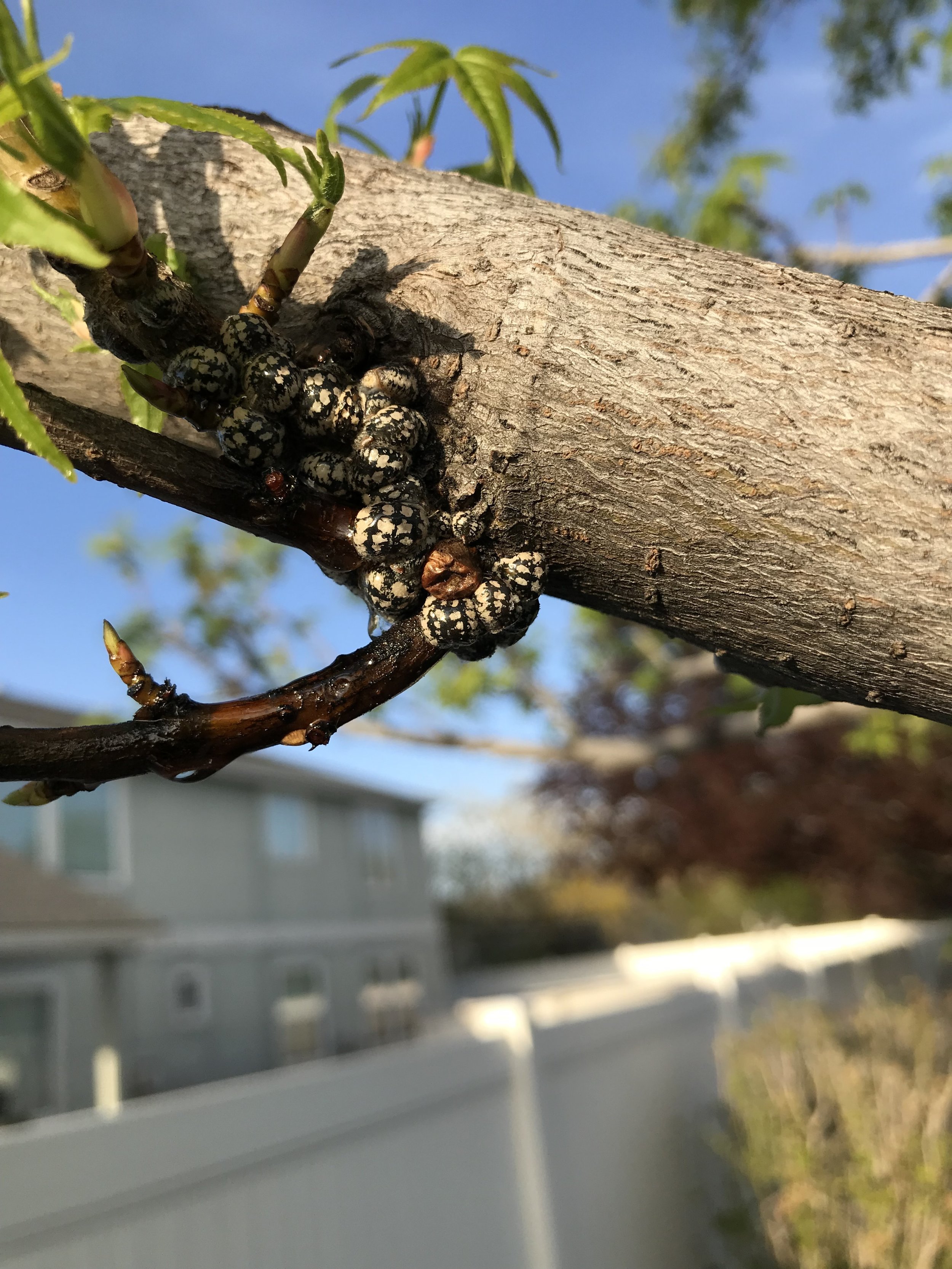
Scale is a sap sucking insect that resembles an oyster shell that either cover branches like the tree pictured above or on the foliage of arborvitae. They can be challenging to control for when their shells are soft, insecticides work; when they are hard they do not. For deciduous trees you can use a systemic insecticide like the Bonide Annual Tree and Shrub insect control. For evergreens it would be better to use a horticultural oil like Bonide All Seasons Oil or Malathion to kill the scales.
An few signs you have scale is if you see shells on branches (not normal), the foliage is sticky or there are a lot of flies hanging around you plants (this also is a sign of aphids too).

Percy Wiseman Rhododendron has bright colored flowers of pinks and corals. Rhododendrons are shade loving evergreens in our area, needing to be shaded from noon to 5 by trees or buildings. Percy reaches about 4 feet tall and wide. Likes soils that moist but not boggy and acidic soils.
Kimono May Snow Azalea is a new azalea with large pure white blooms. They flower later than standard azaleas and behaves like a ground-cover keeping to about 16 inches tall and 36 inches wide. Like Rhodies, they are best planted in noon to 5 shade. Likes soils that moist but not boggy and acidic soils. Azaleas are semi evergreen in our area where they can loose their leaves if the winters are cold enough.
President Grevy Lilac is a "blue" lilac with a strong fragrance and lots of blooms! Lilacs handle full sun to part sun conditions. President Grevy is tall growing to about 8 to 10 feet tall and 10 to 12 feet wide. It makes a great backdrop to other plants or can be used as a hedge mixed with either evergreens or summer blooming plants. Lilacs love alkaline soil and chili winters, so our area is great for them.
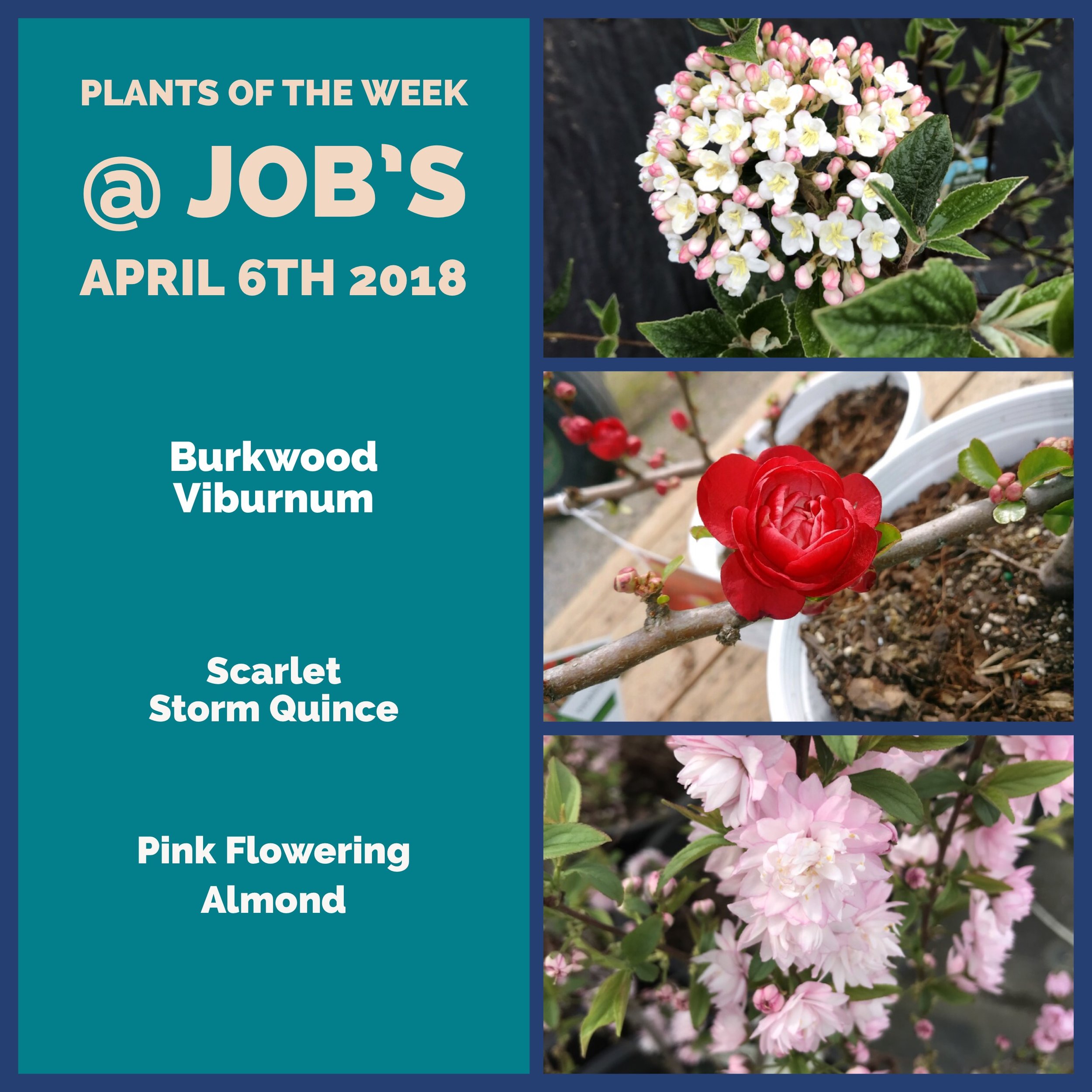
This weeks plants are very durable plants.
Burkwood Viburnum is a fragrant bloomer that reaches 10 feet tall and 6 to 8 feet wide. It's a cousin of the Snowball Bush but blooms earlier and very fragrant, some liken it to jasmine. To contrast the blooms it has glossy green leaves that in fall turn yellow and orange. Prefers full to partial sun.
Scarlet Storm or Double Take Scarlet Quince is a thorn less and fruitless Quince that is more garden friendly. Older Quince varieties could be nasty with the thorns but not any one of the Double Take series of Quince. The dark red blooms emerge before the leaves. Great for a backdrop with perennials in front. Reaches 6 feet tall and wide. Prefers full to partial sun.
Pink Flowering Almond, is actually more related to a cherry than an almond. The double pink blooms cover the branches in early April. Tends to be a little shrubby but can be pruned to be tamed after it has finished blooming. Reaches 5 to 6 feet tall and wide. Prefers full to partial sun.

Magical Gold Forsythia is a large flowering Forsythia that is compact at 5 to 6 feet tall and wide. It's also tends not to get lanky like the larger varieties. It likes full sun to part sun conditions. When it flowers in early March it is covered with large golden yellow blooms, a great way to start spring!
Kramer's Rote Heather is an evergreen that starts blooming in February and goes into April with dark pink flowers. It stays low at a foot high and spreads to about three feet. It prefers afternoon shade in our area.
Marianne Red Anemone is a perennial with gorgeous red blooms. It flowers in March. They reach about 1 ft tall and about 2 to 3 feet wide. In our area they do well in afternoon shade and morning sun. Don't freak out that they go dormant when it gets hot out.

While we don't offer U-Cut trees, here is some information on how to have an adventure getting one from the Umatilla National Forest.
Read MoreDifferent types of grasses need different types of winter clean up. Alex with Job's Nursery walks you through the different types and how to clean them up.
Read More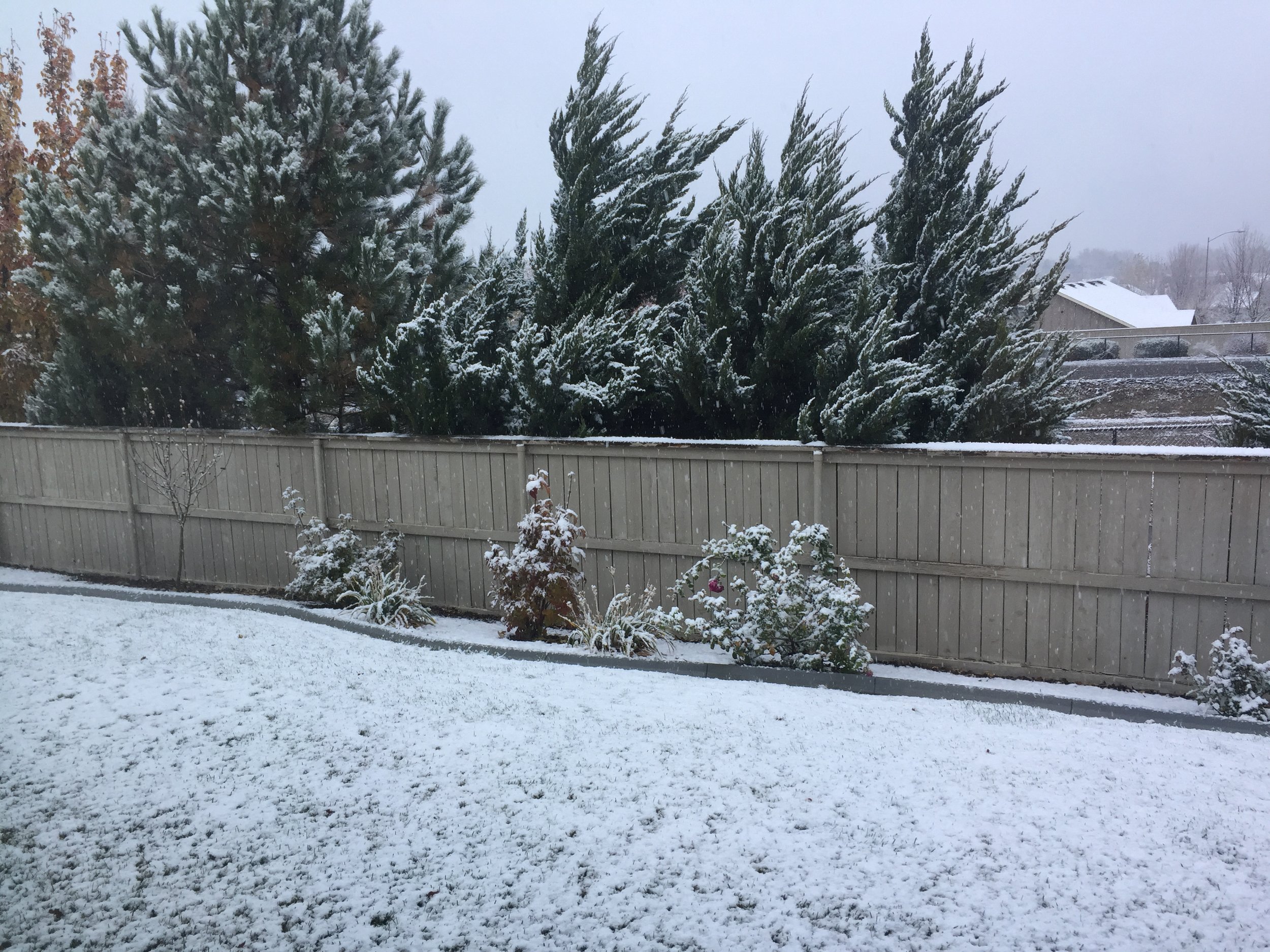
November 5th got some snow which is earlier than normal. Could it hurt plants?
Read More
The 2017 Seed Rack has arrived! It has a great selection of vegetables and herbs to grow a plethora of tasty crops. Follow the links below to see about our selection and when to start vegetables in our area
2017 Seed Selection
Starting Vegetables in the Tri-Cities Handout